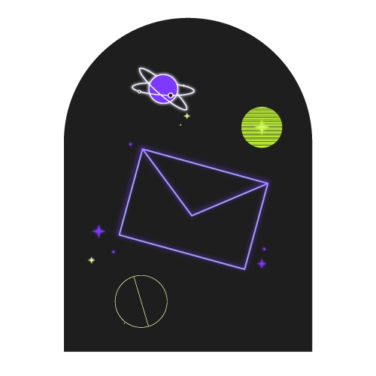If you're on the hunt for your next QA job, check out this guide some advice on how to start out in QA, how to find QA jobs, what a good QA resume looks like. Those are some things an aspiring QA tester might want. Fortunately, we’re here to help answer all your questions about how to become a QA tester.
What Does A QA Tester Job Involve?
The best job description for a Software Quality Assurance Tester (QA tester) is that they are responsible for catching the bugs that software developers can’t. Depending on the type of testing the quality assurance team is asked to perform, that can mean testing the software in typical or atypical ways, examining the product from a functional level or from a user's perspective, and manually testing code or running software to automate tests.
Before any test is executed, a QA tester will have to write a test case. For the uninitiated, a test case states the conditions and variables which a tester will use to determine whether the system effectively passed the test within the testing process. Without a test case to provide an outline for the test plan, a QA tester runs the risk of getting lost in the code and not coming away with any clear or practical conclusions.
Here’s what a test case looks like:
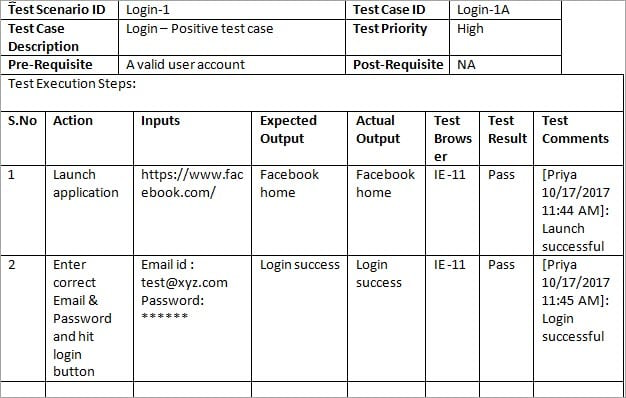
After writing a test case and executing the test, a QA tester documents their findings. This can either be a formal or informal document depending on the type of test ran, who ran it, and what stage of development the project is in.
It’s important that QA testers have a firm understanding of the tools they need to use. In general, QA testers should know about:
- Defect management tools such as Microsoft Test Manager and Jira
- Database management systems such as MySQL and dBASE
- Programming languages such as Python and Java
Top 5 Programming Languages QA Testers Should Know
- Python
- Ruby
- Perl
- C++
- Java
QA Tester Jobs
As mentioned earlier, the job market for QA testers looks promising. In 2017, the Stack Overflow Blog identified QA as one of the fields with the highest demand and lowest supply. Testing is important because quality isn’t an accident. As long as tech companies want to put out quality products, they will need to hire QA testers.
Many QA testers are able to work from home. This can be appealing to people who don’t want to stare down a long commute in the morning, want more time at home with their children, or simply feel that they work better on the couch than in an office.
Prospective testers can look forward to a strong work/life balance. Most jobs require the standard 40 hours per week. Some amount of overtime can be expected though as development deadlines are near and unexpected bugs or technical issues are found.
QA Tester Salary
At some point, you might’ve started wondering how much a QA tester makes. In general, quality assurance salaries are well above the national average. In the United States, a QA tester's starting salary is typically in the low 50,000 range and over the course of five years can grow to over $120,000 a year.
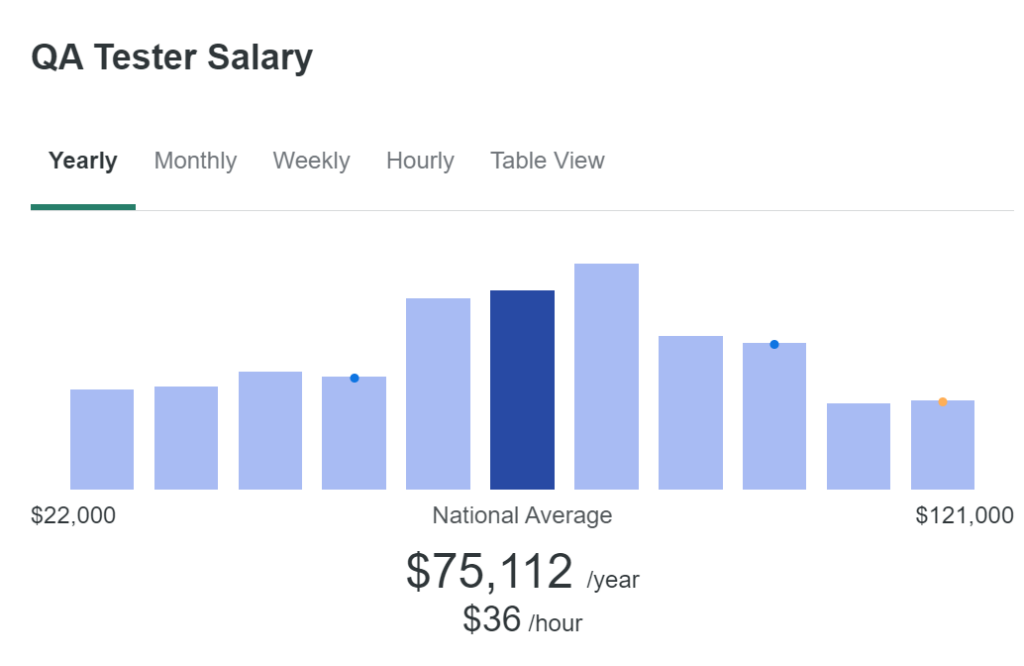
Average QA tester salary in the USA on ZipRecruiter
In the United States, a Junior QA tester will start in the $35-45k range. After a year or two, most junior QA testers will be promoted to the role of QA tester and their salary will rise to $55K. From there, the salary trajectory of a QA tester will depend on which direction they decide to take in their career.
QA Tester Career Path
The career path of a QA tester will depend on their personality and which skills they apply most effectively.
QA testing is a complex blend of soft and hard skills:
- Hard skills will be their ability to write test cases, find patterns and common pitfalls in software, document any found errors, and test effectively.
- Soft skills would be how well they work with others, their ability to encourage co-workers, and their ability to communicate in a clear and precise way.
Hard Skills Specialization Career Path
If, after spending a few years as a QA tester, you feel that your strengths are more aligned with the hard skills, then you may want to consider becoming a highly specialized tester. A career path for such a person would look like the following job titles path:
- Junior QA tester
- QA Tester
- Senior QA Tester
- Software Testing Specialist
- Senior Testing Specialist
Another option for QA testers is to join what some lovingly call the "dark side" and become a developer. This career path will be more tricky as you’ll likely need more education before a company will hire you for the role, and the developer salary is generally a bit higher. However, by building rapport with developers inside your organization, they may be able to help you network and find your first job in development. The transition from a QA tester to a QA developer is less easily defined and relies more on the individual’s persistence in learning new skills. Two other roles that are becoming more common are QA Analyst and QA engineer.
For those QA testers who feel that their soft skills are really their strong point, there are interesting career paths available, too. The first would become a manager. This would be for QA testers who enjoy strong communication between team members and leading projects. Managers make decisions and take responsibility for the actions of their team. Many job postings are made internally and positions such as resource manager, test lead, or project manager frequently come up.
Learn more about Project Managing QA.
QA Tester Job Education
Now that you’ve heard about what a QA tester does, the career prospects and you’re expected salary, you’re maybe wondering how much education (if any) you need to enter this profession. Two years? Four? Eight? Fortunately, most jobs require a bachelor’s degree at most, typically in the computer science or information science fields.
If you don’t have a bachelor’s degree in computer science and going back to school for four years is not an option, there are still avenues available to explore. The tech industry leads in terms of finding people from different educational backgrounds to hire. Sam Ladah, IBM’s head of talent organization, calls these “new collar jobs” - a field “where skills matter more than degrees.” Currently, the best way for a prospective QA tester to get their foot in the door would be through passing an International Software Testing Qualifications Board (ISTQB) exam.
The ISTQB is a non-profit organization registered in Belgium. Their test is standardized qualification for QA testers around the world. Many organizations require their testers to pass the test. There are three levels of certification for their tests:
- Foundation level
- Advanced level
- Expert level
These three levels are broken down into different topics, which are further divided into sub-topics.
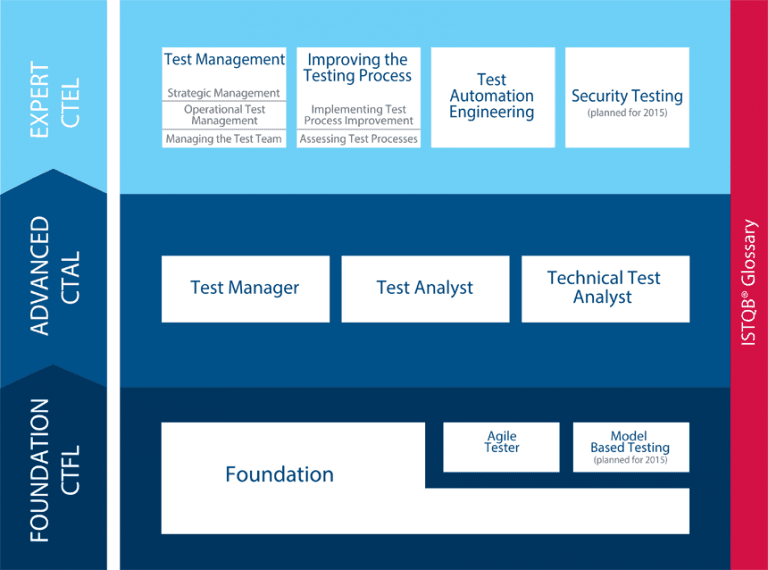
(source: Certible.com)
After taking the foundation level exam, testers will leave with a strong understanding of the core concepts of testing.
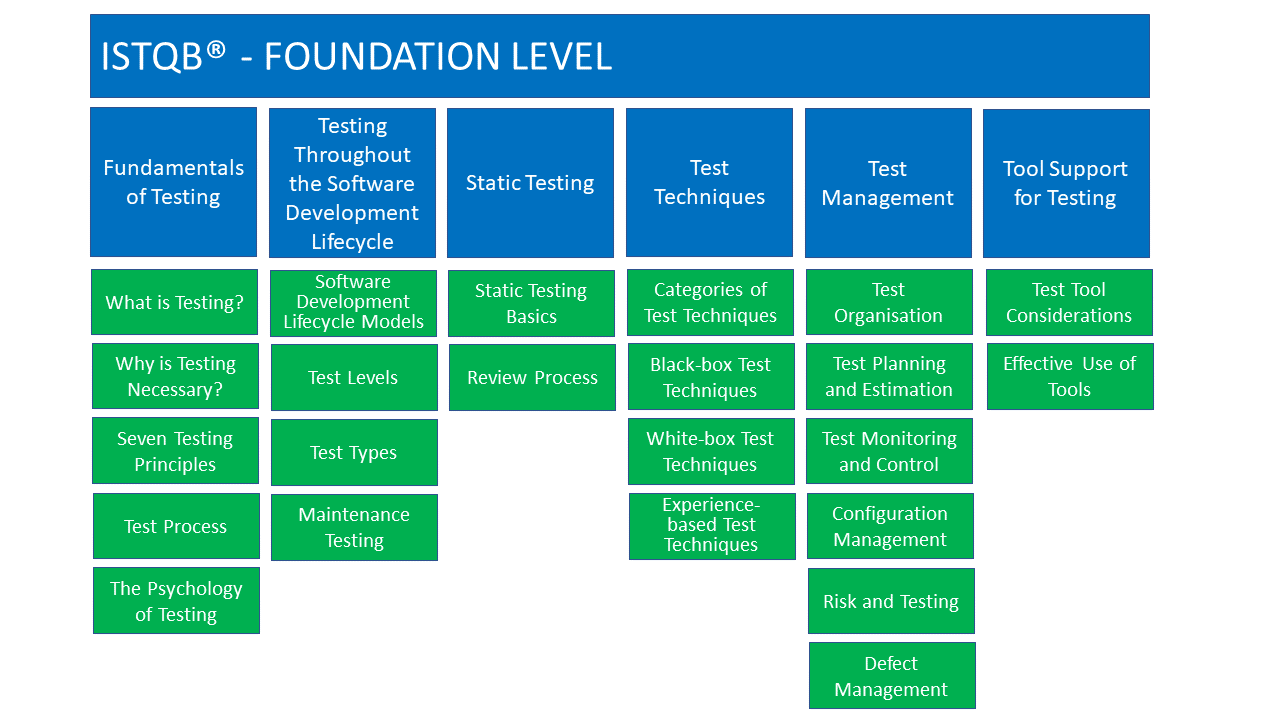
(source: ISTQB)
Here’s another exciting piece of information about the ISTQB exams: absolutely anybody can take the foundation level exam.

Online education sites such as Udemy and LearningTree offer prep courses for the ISTQB foundation exam. The Udemy course, for example, is an hour and a half of videos, with sample exam questions and advice on how to approach the official exam. If you’re completely new to the world of QA testing, the ISTQB recommends taking a course from one of their Accredited Training Providers. A list of such providers can be found here. The exam itself is composed of 40 multiple-choice questions and test takers must receive a score of 65% or higher to pass the exam. Candidates have an hour to finish the exam.
An ISTQB report found that 75% of the foundation level certification did so to improve their career prospects.
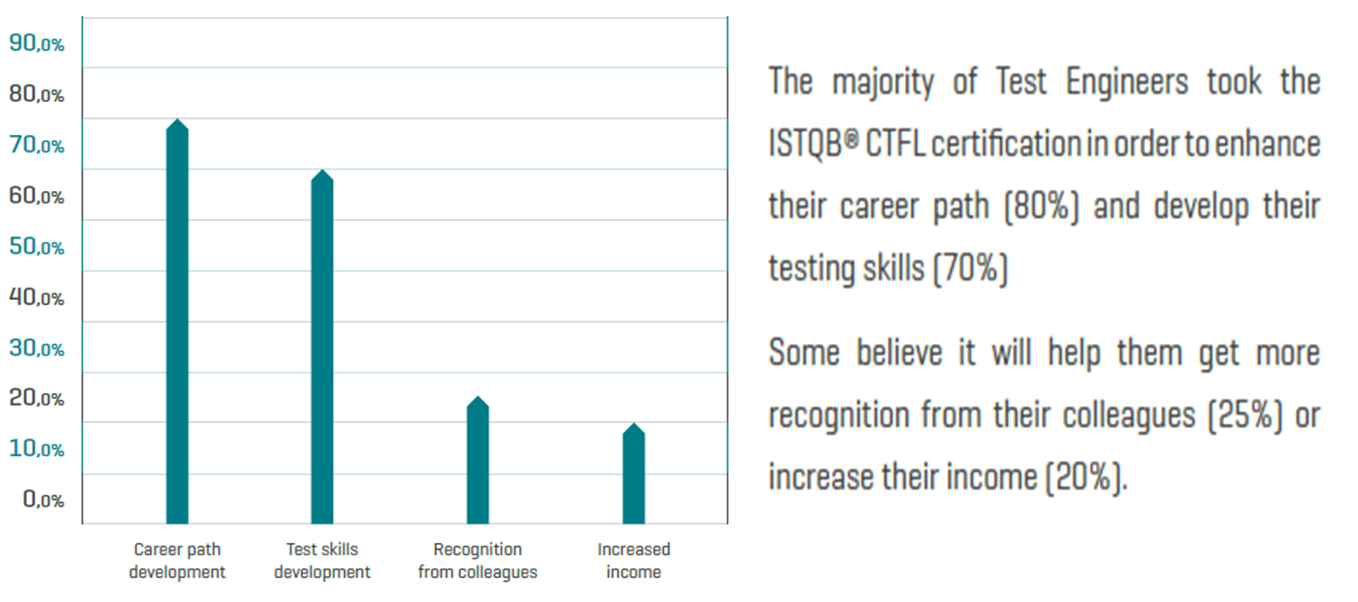
(SOURCE: ISTQB).
There are many ways to become a QA software tester. Some are traditional while others have become possible only with the advent of the internet and an organization's willingness to overlook traditional requirements in favor of new methods.
While mastering various testing frameworks is essential for a QA tester, it's equally important to be proficient in specialized software. For instance, if you're working in an Agile environment that uses Jira, you'll benefit from understanding how to use test management tools designed specifically for Jira.
QA Tester Job Resume
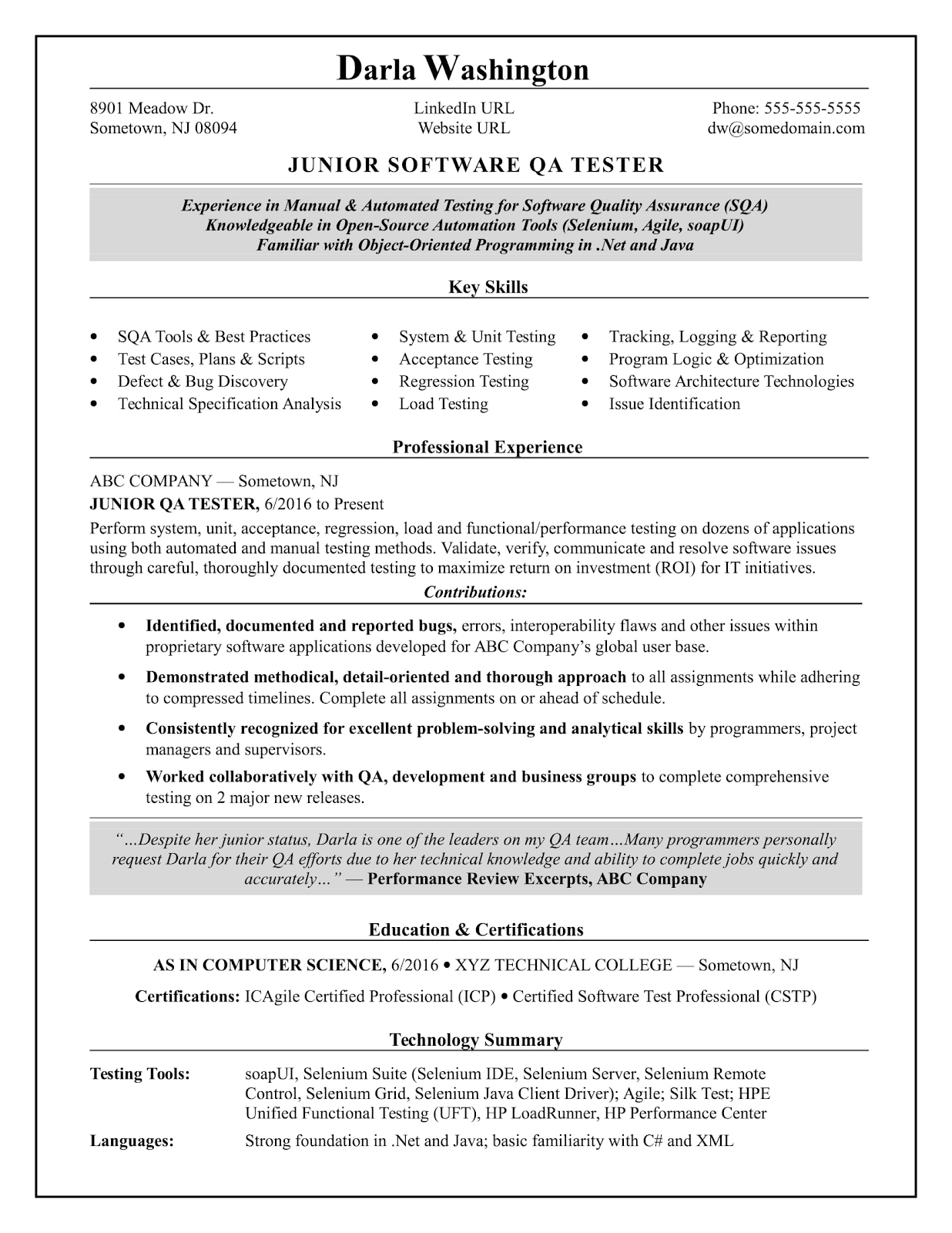
(source: Monster.com)
Here’s an example of a strong junior QA tester resume. We can see that the applicant has been formally educated in computer science, has experience working with key tools such as soapUI and Selenium, has spent the past few years running tests of various kinds (regression, unit, acceptance, load, and functional), and clearly has the skills that employers look for in a QA testers resume.
Even without years of experience working as a junior QA tester, an applicant with a similar resume, looking for work in a junior QA role, will turn the heads of many hiring teams. The same is true for the applicant’s education. Replacing the bachelor’s degree with an ISTQB certification would also appeal to organizations.
What Do You Think
Being a QA tester is a lucrative and stable position. Does being a QA tester interest you? Let me know in the comments!
Learn more about managing your career from an internationally renowned, award-winning software engineering consultant, author, and coach in this article: LEADERSHIP IN TEST: MANAGING YOUR CAREER


